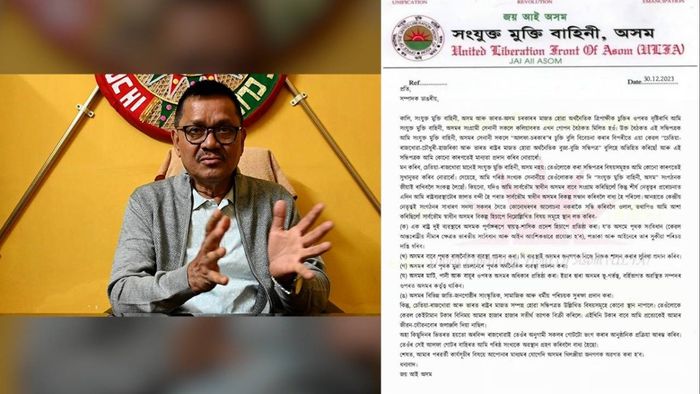Assam: Fake letter controversy erupts after ULFA peace deal
After an unsigned letter on ULFA letter pad surfaced denouncing the peace deal and vowing to keep the organization alive, the outfit's pro talk faction leader Anup Chetia has said that the letter is fake.

- Dec 30, 2023,
- Updated Dec 30, 2023, 6:18 PM IST
After an unsigned letter on ULFA letter pad surfaced denouncing the peace deal and vowing to keep the organization alive, the outfit's pro talk faction leader Anup Chetia has said that the letter is fake.
An unsigned letter on ULFA letter pad has been doing the rounds of local media in Assam where questions have been raised on the tripartite peace deal that was signed yesterday in New Delhi.
The letter begins with the statement that the peace treaty signed yesterday is only being recognised as an "economic understanding between Chetia-Rajkhowa-Chowdhury-Hazarika and the country of India."
The letter further mentions certain ULFA cadres have decided to keep the organisation alive. This is in stark contrast to the fact the ULFA leaders, as part of the treaty, have agreed to disband the organisation.
It was also stated in the letter that the ULFA leaders have gone ahead and signed the peace treaty without consulting the general members of the pro talk faction.
Reacting to the controversy arising out of this unsigned letter, ULFA (pro talk) faction leader Anup Chetia told India Today NE that it is a fake letter and should not be taken seriously.
"I can state with absolute certainty that this letter is fake. It has probably been created by some other organisation and circulated around to create controversy. Since there is no undersigned in the letter, there is no proof that this letter can be taken seriously," Chetia told India Today NE.
On being asked whether there is any disagreement within the ULFA (pro talk) camp at this moment, Chetia said nothing like that prevails.
"There is no controversy or dispute within the organisation," said Chetia.
Noteworthy is that in the controversial letter, it was also stated that certain ULFA members had hoped that the peace treaty would include provisions such as a separate constitution for Assam, a separate currency for the state, a separate political system for the people of Assam to govern themselves, among others. However, none of these points mentioned in the letter are there in the treaty that was signed yesterday.
The accord signed yesterday, a culmination of years of negotiations, aims to bring an end to the decades-old insurgency that has plagued Assam. Addressing a spectrum of longstanding issues encompassing politics, economics, and society, the agreement reflects a concerted effort to foster lasting stability in the region.
Notably absent from the agreement was the hardline faction of ULFA, led by Paresh Baruah, who steadfastly rejected the olive branch extended by the government. Baruah, believed to be residing along the China-Myanmar border, has remained a vocal opponent of the peace talks.
The pro-talks faction, under the leadership of Arabinda Rajkhowa, initiated unconditional discussions with the central government in 2011, overcoming strong opposition from the Baruah-led hardline faction.
The ULFA, formed in 1979 with the initial demand for a "sovereign Assam," had become a focal point of insurgency, leading the central government to declare it a banned outfit in 1990.